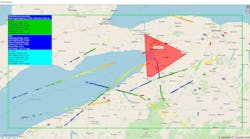By Ben Ames
Baltimore —Officials at major private-sector security firms and prime contractors say the key to doing business with the Department of Homeland Security (DHS) is to use current technology instead of developing new technology.
Planners at DHS are trying to prevent future terrorist attacks on domestic soil. Their challenge is a growing gap between over-committed military authorities and underpowered civilian authorities, said Suzanne Jenniches, vice president and general manager of the Government Systems Division for Northrop Grumman in Baltimore.
As part of a panel of private-sector company representatives, Jenniches spoke about the challenges of doing business with the federal government. Panelists addressed attendees May 18 at the Homeland Security Solutions Conference & Exhibition held in Baltimore. Also on the panel was Paul Clark, vice president for homeland security at BAE Systems North America in Arlington, Va., and Frank Mandelbaum, chairman and chief executive officer of Intelli-Check in Woodbury, N.Y.
Prime contractors like Northrop Grumman are now trying to fill that gap between military and civilian authorities, and adapt to a new market. "Our primary focus was national defense. Now we're transitioning to include homeland security, domestic civilian forces, and military peacekeeping forces," Jenniches said. Planners at Northrop Grumman are focusing on a few markets: weapons of mass destruction, critical infrastructure protection, border security, and commercial aircraft protection.
"We try to transfer existing technology as opposed to developing new technology," she said. "That will change as HSARPA [Homeland Security Advanced Research Projects Agency] matures. But now, DHS is looking for mature solutions in bio-terror detection, intelligence gathering and analysis, border security, first-responder help, IT netting, and rapid information sharing."
DHS planners are looking for entire systems and networks, not single components, agreed BAE Systems' Clark. There is a continuing need for systems integrators to build those finished platforms, he added.
A manufacturer of discrete components — such as printed circuit boards or embedded circuits — would probably be unsuccessful at entering the market for homeland security devices through a direct relationship with DHS or even with a prime contractor, Jenniches said.
Rather, such manufacturers should approach a tier-two supplier, who would incorporate their technology into a more mature product. Prime contractors buy finished black boxes, not discrete integrated circuits, she said.
In a few market sectors, engineers at Northrop Grumman have acted as vertical integrators, assembling products for electro-optics, sonar, radar, or electronic warfare.
"But even there, we buy at a higher level than we did 20 years ago," she said. "In homeland security, the cost for us to develop chemical and biological agent sensors is prohibitive, given the market size. So we go out and buy at the black box or subsystem level. We're looking to form long-term partnerships with small companies or universities who have these new technologies. Then we bring the skills to ruggedize the design and do business with the government."
When the U.S. Postal Service needed anthrax detectors, designers at Northrop Grumman took a commercially available technology and added their expertise: they packaged it for an industrial environment, tested it to reduce false positives (for example, paper dust is a biological element that trips many sensors), and arranged software, deployment, installation, and maintenance. That is how they delivered a product within six months, she said.
To succeed in federal markets, private-sector companies must learn to integrate entire platforms, agreed Mark Shaheen, vice president at The Civitas Group in Washington.
His group published a Feb. 6 study, "Key Private Sector Implications of the FY 2005 Homeland Security Budget Request." It is available to download for free at www.civitasgroup.com. Shaheen was another speaker at the Homeland Security Solutions conference.
"Until now, the homeland-security market has been unfocused. Companies have been selling solutions, not products," he said. "Now the private sector is better understanding how to do business with the government. But one remaining challenge is the lack of national standards."
One model that small technology suppliers could emulate is Dell Computer of Austin, Texas.
"We need better integration of technologies, like Dell has done in the PC market," Shaheen said. "In the mid-'80s, you would order various parts of a computer and hope they fit together. But now, you can configure a specialized computer on the Web in 20 minutes. Similar integration is needed to link cameras, sensors, and checkpoints."
One of the strongest business opportunities in homeland security is aviation security, particularly for screening, he said.
The U.S. Federal Aviation Administration (FAA) has budgeted $55 million in fiscal year 2005 for cargo screening, with more to come from the Transportation Security Administration (TSA). Other needs include identification technologies, data analysis, tracking, and counter-MAN-PADS (Man-Portable Air Defense System, also known as shoulder-fired missiles).
Other federal markets include port and maritime security, and ground transportation. In addition, border security alone could generate $10 billion over the next decade in demand for technologies for identification, truck scanning, data analysis, and remote surveillance, Shaheen said.


